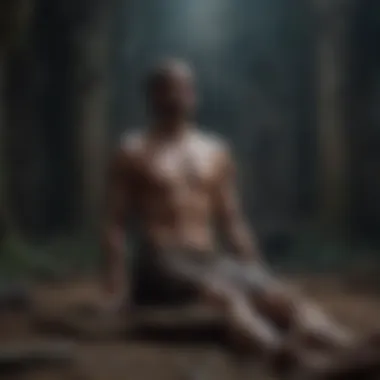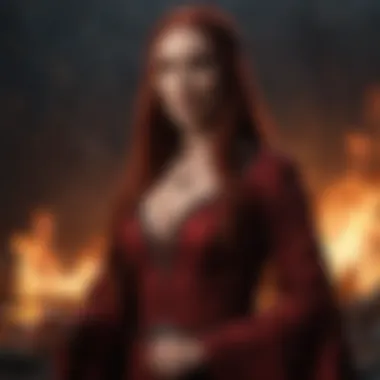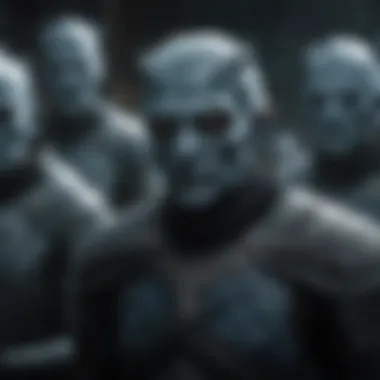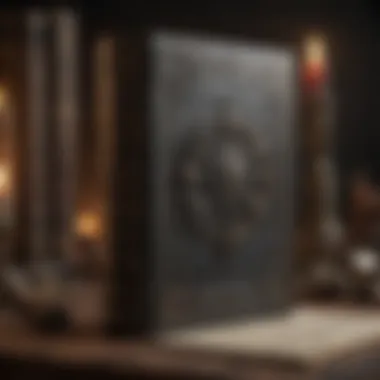Exploring Necromancy in Game of Thrones: Power and Morality


Intro
In the Game of Thrones universe, necromancy isn’t just a tool for raising the dead; it’s a complex tapestry woven into the very fabric of the story. The allure of controlling life and death permeates the narrative, shaping characters and challenging morality. As we traverse the tumultuous landscape of Westeros, we encounter powerful figures like Melisandre, whose fire-riddled magic holds sway over life itself, and the chilling Night King, a figure of death and despair.
This article explores the myriad dimensions of necromancy, delving into its historical roots and philosophical implications. A closer look reveals that necromancy goes beyond necrotic magic. It embodies the human struggle with mortality and power, threading through conflicts and character arcs that have captivated audiences. From moral dilemmas faced by characters to overarching themes within the show, each facet is significant in understanding the interplay of life, death, and dominion in this fantasy realm.
As we unravel the intricate narrative, key characters, and their pivotal actions, we’ll arrive at a deeper comprehension of how the nuances of necromancy reflect larger existential questions. Thus, get ready to navigate the shadows of Westeros, where the boundary between the living and the dead merges into a thought-provoking narrative.
Understanding Necromancy
Necromancy, a term that often elicits vivid imagery of dark rituals and the reanimation of the dead, holds a rich tapestry of meaning within the Game of Thrones universe. Understanding this concept is crucial, not only to grasp the magical elements at play but to dissect the moral and philosophical questions it raises. At its core, necromancy transcends mere magic; it embodies a struggle for power and control over life and death.
In this article, we will navigate through several dimensions of necromancy, focusing on how it shapes character arcs, drives the narrative, and delves into the ethical implications of manipulating death.
Defining Necromancy
Necromancy can be defined as the practice of conjuring and communicating with the deceased, whether to glean information or to create a semblance of life from death. Unlike other forms of magic, which may center around manipulation of elemental forces or healing, necromancy deals with the profound and often unsettling ways in which the living interact with the dead.
Features of Necromancy
- Resurrection: Brought to life, albeit artificially, beings regain movement but lose their original essence.
- Communication: Practitioners often seek to speak with souls to gain insight or advice, creating a bridge between realms.
- Control: Controlling the dead often serves as a metaphor for power over mortality, indicative of the greater struggles characters face in the series.
Each facet offers a glimpse into the psyche of characters who wield such powers and the consequences that ensue.
Historical Context in Literature and Myth
The roots of necromancy run deep in various literary traditions and mythologies. In ancient texts and folklore, it was often associated with forbidden knowledge and the dark arts. The tales of figures like the Greek sorceress Circe or the biblical account of the Witch of Endor illustrate how necromancy has tangled with moral quandaries across cultures, often seen as a violation of natural laws.
Exploring the historical context can shed light on how necromancy operates within Game of Thrones.
- In many cultures, necromancy is tied to a fear of death and the unknown. This echoes the sentiments of several characters who grapple with mortality.
- The practice also raises questions about the morality behind such powers. Is seeking to resurrect those we've lost an act of love, or does it tread into selfish territory?
Understanding this historical background can deepen the appreciation of the portrayal of necromancy in the series and unveil the thematic resonance it holds within the storyline.
"Necromancy is the whisper in the dark; a bridge between what is and what might have been."
With this backdrop, we are now equipped to delve more specifically into the manifestations of necromancy in the Game of Thrones narrative.
Necromancy in Game of Thrones
Necromancy serves as a critical element in the Game of Thrones narrative. It interweaves itself into major themes and character arcs, merging the realms of fantasy and moral complexity. This mystical practice isn't just a tool for storytelling but a profound examination of the very fabric of life and death. It reveals the motivations of key characters while prompting the audience to ponder the ethical implications of bringing back the dead.
Origins within the Story
The origins of necromancy in the world of Game of Thrones are steeped in both ancient traditions and fantastical lore. It emerges from folktales and myths, echoing ideas of resurrection from various cultures. In the series, the use of necromancy isn't an isolated phenomenon; it forms part of a larger tapestry of magic that includes blood magic and fire-based abilities exemplified by Melisandre. The first inklings we see are through the resurrection of the dead, culminating in the rise of the White Walkers as a formidable force.
Key Practitioners of Necromancy
Melisandre's Use of Blood Magic
Melisandre’s brand of necromancy is fascinating as it melds blood magic and ritualistic sacrifice. Her actions paint a complex picture of morality, particularly in her attempts to resurrect Stannis’s fallen son. Melisandre believes that the blood she uses channels power, suggesting that the essence of life and death is intertwined with the bloodline. This aspect of her magic raises questions about the lengths she is willing to go for her beliefs. The key characteristic here is that Melisandre sees herself as a tool for a larger purpose, demonstrating a chilling pragmatism about death and resurrection.


Advantages: Her approach exemplifies the seductive nature of power in the narrative, symbolizing how desperation can manipulate people into ethical blind spots.
Disadvantages: However, this power often leads to unforeseen consequences, raising moral dilemmas that resonate with the viewers, creating a canvas of grey moralities.
The Night King's Rituals
The Night King's rituals demonstrate the darker side of necromancy. His ability to raise the dead showcases a ruthless strategy aimed at dominating the living. This aspect highlights his motivation for power, contrasting it starkly with Melisandre, who at least has a guiding belief. His rituals culminate in a single, foreboding purpose: to extinguish humanity.
Key characteristic: The Night King's force is relentless, reflecting an unyielding vision of death that’s devoid of empathy. His power over death amplifies the stakes for the living characters.
Advantages: This creates tension in the plot, allowing viewers to explore the theme of inevitability when facing a foe that commands life and death.
Disadvantages: Nonetheless, his one-dimensional approach risks simplicity, making him more a symbol of death rather than a nuanced character.
The Role of the White Walkers
The White Walkers act as the embodiment of necromancy's overarching themes. Created through ancient magic, these beings represent a force that disrupts the natural order. Their existence raises critical questions about life, death, and the consequences of meddling with the natural cycle. They do not just represent death; they challenge the philosophies held by the living characters.
Key characteristics: The White Walkers are unlike typical antagonists, lacking motivation beyond a directive to destroy which makes them a unique antagonist force in the narrative.
Advantages: Their role emphasizes the existential threat to human life, embodying the themes of consequence and sacrifice prevalent throughout the series.
Disadvantages: However, their portrayal runs the risk of being purely villainous without depth, limiting the viewers' engagement with their underlying lore.
"Necromancy is not simply a control over death, but a disruption of life itself, leading to questions of morality, consequences, and the interpretation of existence."
Philosophical Implications of Necromancy
In the realm of Game of Thrones, necromancy isn't merely a plot device; it’s a vehicle for exploring profound philosophical questions. The practice of raising the dead and its entailed consequences unveil deeper themes surrounding the human condition. Topics like the interplay of life, death, and power arise, revealing the unsettling dynamics of existence in a world fraught with violence and betrayal. The ramifications of these actions ripple through character arcs and narrative structures that compel viewers to ponder the ethical dilemmas faced by their favorite characters.
Life, Death, and Power
At its core, necromancy in Game of Thrones challenges the boundaries between life and death, questioning who possesses the authority to manipulate them. Characters like Melisandre embody this quest for power, viewing resurrection not as an unnatural act but as a means to an end. Conversely, the Night King represents death's triumph over life, serving as a testament to the fragility of existence itself.
The act of resurrecting the dead does more than simply rejuvenate a physical form; it invites a discussion on what it means to truly live. With each resurrection, one must ask: is the essence of the person retained, or has their identity been irrevocably altered? Such inquiries touch upon the nature of power—who gets to decide which lives return and what remains of those who once lived?
"The true horror of necromancy lies not in the act itself, but in the implications it has on those left behind."
Consequences of Resurrecting the Dead
Diving into the consequences of resurrecting the dead exposes significant moral dilemmas that haunt the characters involved. Moral Dilemmas emerge whenever characters confront the fallout of their decisions. For instance, when Jon Snow brought back to life a close friend, it raised questions about whether the living can truly play God. This act illustrates the lengths to which individuals are willing to go in pursuit of their desires and the inevitable repercussions that follow.
Moral Dilemmas
The moral dilemmas within necromancy extend into discussions about the sanctity of life and death. Raising the dead often carries heavy emotional and ethical burdens, challenging the characters to navigate a web of complex feelings. The possibility of wielding life and death as tools for ambition fosters a dangerous cocktail of power and responsibility. It forces one to consider the emotional toll on those who witness a loved one returned as a mere shadow of what they once were. The ethical landscape is littered with gray areas, making it a compelling focal point.
- Key characteristics of Moral Dilemmas:
- Ambiguity of right and wrong
- Impact on character relationships
- The broader implications for the community
Ultimately, these dilemmas become an integral part of character development, showcasing growth or moral decline depending on their choices. Decisions grounded in self-interest frequently alienate characters from their communities and loved ones.


The Nature of the Soul
In parallel, exploring the nature of the soul brings an additional layer of complexity. When characters like Catelyn Stark are resurrected, it raises essential questions about identity and essence. Is the soul a mere byproduct of the body, or does it contain an indelible mark of individuality? What happens when a soul is returned to a lifeless body? The integrity of the person may hang in the balance.
- Key characteristics of The Nature of the Soul:
- Integral to personal identity
- Philosophical implications of existence
- Contrasting views on what constitutes a living being
The unique feature of contemplating the soul rests in this ambiguity. Some characters are compelled by a longing for connection, while others might see value solely in power. The advantages of dissecting these concepts lie in deepening one’s understanding of what it means to be human, while disadvantages might present a challenge in reconciling their beliefs with their actions.
Each philosophical implication of necromancy weaves a tapestry that adds depth to the overarching narratives in Game of Thrones. These layered discussions encourage viewers not only to engage with the storyline but also to reflect on their values concerning life, death, and the moral implications of power.
Character Analyses
In examining necromancy within the Game of Thrones universe, character analyses hold a pivotal role. They offer a lens through which we can understand not only the practice of raising the dead but also the broader themes of morality, ambition, and power that underpin the narrative.
Through character studies, we discern how necromancy influences decisions, reveals fears, and expresses desires of the protagonists and antagonists alike. These insights enhance our grasp of the narrative's emotional depth and philosophical nuances, fostering a more enriching experience for viewers and readers.
Melisandre: Faith and Ambition
Her Beliefs about Resurrection
Melisandre's beliefs about resurrection are deeply intertwined with her faith in the Lord of Light. She perceives death as just another step in a grand cosmic game, fueled by the notion that the fire will ultimately bring forth new life. This viewpoint drastically shapes her actions throughout the series. Rather than viewing death as a final end, she embraces it as an opportunity for rebirth.
This characteristic renders her a compelling choice for our analysis as it unravels the intricacies of her motivations. Her talent in resurrection showcases not only a confidence in supernatural power but also a desperation to manipulate events to serve her prophetic vision.
However, her reliance on this philosophy leads to significant consequences, wading into a morally gray area. While she helps key characters return from the brink, it raises questions about the implications of tampering with fate.
Effects on Key Characters
The ramifications of Melisandre's actions and beliefs ripple through the Game of Thrones landscape. Characters such as Beric Dondarrion and Jon Snow experience resurrections, which compound the series' exploration of mortality. This thread transcends mere shock value; it serves as a narrative vehicle that unravels the character’s psyches.
Notably, Jon Snow's resurrection spurs significant internal conflict as he grapples with his newfound lease on life. The moral weight of his return is a flavor distinct to his journey. It tempts one to question whether he is the same man or a mere shadow haunted by the memories of the past. While these effects enrich the overarching themes in the series, they also add layers of complexity that illustrate how potent the connection between life and death can be.
The Night King: The Antagonistic Force
Motivations Behind His Actions
The Night King, a figure draped in chilling mystery, epitomizes a ferocity in his belief system that offers a sharp contrast to Melisandre’s ardent faith. His motives appear driven less by a desire for dominion and more by an existential need to erase life itself. He embodies the unrelenting advance of death, showing no inclination toward resurrection for anything but sheer domination.
This depiction as a life-taker elevates him as critical for exploring necromancy's darker implications. The unique element here is his ability to wield death as a weapon, not as a pathway to deeper understanding or mastery.
However, the Night King’s motivations might come across as singularly ruthless—this can be a double-edged sword in terms of character depth, posing challenges for audience connection. Still, he raises profound questions of existence and fear, thereby serving as an important foil to characters like Jon Snow.
His Command over the Dead
His chilling command over the dead is both a visual spectacle and a narrative device that underscores the stakes involved with necromantic practices in Game of Thrones. Through raising armies of wights, the Night King transforms the dead into instruments of terror, showcasing necromancy as a tool of control rather than resurrection.
The unique feature of his powers highlights the potential for necromancy to veer into absolute moral decay. While elevating tension within the plot, this aspect invites viewers to contemplate what it means to command death itself—a somewhat macabre type of power that suggests dominion over their minds and wills.
Nevertheless, as his pursuits clash with the forces of life, the series lays bare the philosophical ramifications of such necromancy, reflecting the dire consequences faced by those who choose to wield it without concern for moral quandaries.


Jon Snow and Death's Role
Interplay with Resurrections
Jon Snow's interactions with the concept of resurrection paint a rich tapestry of internal struggle and growth. He is near death several times, yet every resurrection leads to a marked transformation in his character. Each return from the dead is not merely a reclaiming of life but an invitation into deeper layers of purpose and duty.
This interplay reflects the philosophical undercurrents prevalent throughout the series. Viewers witness Jon's complex relationship with death, threading hope and despair together. His resurrections hinge on his inherent goodness, loyalty, and sense of justice, solidifying him as a paladin of virtue amidst the backdrop of moral ambiguity surrounding necromancy.
Philosophical Stance on Life
Jon’s stance on life emerges as a counterpoint to the manipulative aspects of necromancy that characters like Melisandre and the Night King portray. He often exudes a sense of responsibility and reverence toward life and the dead alike. His belief that each life carries profound weight serves as a thoughtful commentary on the value of mortality within a fantastical realm that often trivializes it.
His character encourages poignant exploration of themes of honor, sacrifice, and the sanctity of life itself. However, this intrinsic morality complicates the narrative as Jon seeks to navigate the murky waters surrounding his own resurrections—each return serves as a weighty reminder that life shouldn't be taken lightly.
Through Jon Snow, Game of Thrones meticulously examines these philosophical tenets, underscoring the power dynamics at play in a world where the dead can rise and the living must grapple with the repercussions.
Plot Quirks and Narrative Development
In the realm of Game of Thrones, the concept of necromancy weaves itself intricately into the narrative fabric, influencing character arcs and overall storylines. This exploration not only highlights the central themes of power and mortality but also emphasizes the unexpected twists and quirks that come from the act of manipulating life and death. The unpredictable nature of necromancy often sends shockwaves through the established dynamics between characters, leading to a rich tapestry of struggles and conflicts that keep audiences on the edge of their seats.
Necromancy serves as a catalyst for significant plot developments, affecting relationships and motivations. When resurrected characters like Jon Snow and those controlled by the Night King emerge, they bring with them not just new abilities but also emotional baggage. This dissonance sparks tension—who welcomes these beings back, and who is haunted by their presence? A masterfully crafted storyline loosens the reins of predictability, allowing for unexpected character growth and moral challenges.
Shifts in Character Dynamics
Characters in Game of Thrones are often faced with the repercussions of necromancy—some embrace it, while others vehemently oppose its implications. For instance, Melisandre’s obsession with bringing back the dead introduces a dramatic shift within the group dynamics surrounding Stannis Baratheon. Her faith in visions from the Lord of Light, amplified by her use of blood magic, alters the power balance within Stannis’s camp, leading to both temporary alliances and profound mistrust.
A prime example is the relationship between Jon Snow and the characters around him. After Jon's resurrection, some members of the Night's Watch struggle to reconcile their beliefs about life and death and the significance of Jon's return. His return influences the foundation of leadership and allegiances, serving as a direct commentary on loyalty and sacrifice—not just for those returning but for those who choose to accept them back. This creates a flowing river of tensions that feeds the narrative, allowing the audience to explore the consequences of decisions made under the spectral shadow of death.
Debates on the Function of Necromancy in the Plot
Necromancy does not merely function as a plot device; it evokes heated debates surrounding its moral implications and dramatic weight. Casual viewers, along with dedicated fans of the series, often find themselves contemplating whether the ends justify the means. Should every fallen hero be revived? And at what cost to their original selves? The series poses these challenging questions, engaging audiences in discussions that extend far beyond the screen.
Critics and fans alike have dissected the functionality of necromancy throughout the series. Some argue that it weakens the stakes—if characters can return from the dead, does it render their sacrifices meaningless? Others suggest that it enriches the narrative by deepening character dilemmas and exploring the ethics of resurrection. The creation of the White Walkers as a chilling force, under the command of the Night King, further complicates this debate. Are they mere tools of necromancy, or do they represent something darker about humanity's penchant for power and control?
In essence, the use of necromancy in Game of Thrones transcends its magical properties, leading to rich narrative explorations about the enduring effects of death, the fragility of life, and the moral implications of exerting power over both. As viewers, we are left to ponder our feelings about these practices, providing room for diverse interpretations and conversations long after the series has concluded.
Culmination and Future Considerations
The intricate webs of necromancy woven throughout the Game of Thrones saga leave an indelible mark on both characters and the overarching narrative. This exploration into the dark arts is not merely an exercise in fantasy; it provokes deeper contemplation on mortality, ethics, and the consequences of wielding such formidable power.
One of the most compelling aspects of necromancy in the series is its ability to serve as a mirror reflecting the characters' inner struggles. The weight of ambition bears heavily upon individuals like Melisandre, whose fervent belief in her powers drives the narrative forward, yet raises questions about her morality and the cost of her choices. Similarly, the Night King embodies an almost tragic villainy that challenges viewers to consider the fundamentals of life and death. By resurrecting the fallen, these characters tread a fine line, illuminating the fragile balance between life and decay.
"Necromancy is not just about raising the dead; it’s about the messages we choose to send from beyond the grave."
The Lasting Impact of Necromancy in the Series
The lasting impact of necromancy is felt not only in the character arcs but also in the thematic essence of Game of Thrones. It resonates through pivotal moments, shaping how characters interact with each other and the world around them. Several key elements stand out:
- Repercussions on Character Development: Characters are forced to confront their motivations and the moral implications of their actions. For instance, Jon Snow’s experiences with death and resurrection push him toward greater introspection.
- Narrative Tension: The uncertainty surrounding the reanimated dead creates palpable suspense. Every encounter raises stakes, keeping viewers on edge and invested in character fates.
- Exploration of Power Dynamics: Necromancy reveals the thirst for power that drives many characters. The manipulation of life and death serves as a symbol for the broader political maneuvering present in the series.
This pervasive influence illustrates how necromancy is not just a plot device but a rich vein that the narrative mines for philosophical and emotional depth.
Reflections on Mortality in Fantasy Literature
Fantasy literature, particularly in works like Game of Thrones, inherently wrestles with themes of mortality. Necromancy amplifies these existential questions, providing fertile ground for reflection:
- The Nature of Existence: It prompts readers to ponder what it means to truly live. If one returns from the dead, are they still the same person? This theme is evident when characters like Beric Dondarrion exhibit a form of moral ambiguity with each resurrection.
- Transience of Life: The understanding that life is finite gives actions weight. Necromancy challenges the accepted order, making characters reconsider the value and sanctity of life itself.
- Legacy and Memory: The dead linger, and their memories often dictate the actions of the living. The manipulation of past lives through necromancy highlights how history and legacy shape personal narratives.
By examining these aspects, one gains a greater appreciation for how Game of Thrones uses necromancy not simply as a supernatural element, but as a lens through which to delve into profound philosophical inquiries that resonate beyond the walls of Westeros.



